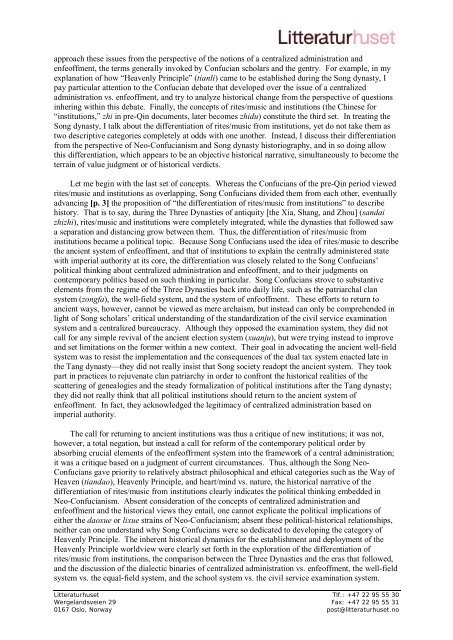20 2011 Opening speech by Prof. Wang Hui ... - Litteraturhuset
20 2011 Opening speech by Prof. Wang Hui ... - Litteraturhuset
20 2011 Opening speech by Prof. Wang Hui ... - Litteraturhuset
You also want an ePaper? Increase the reach of your titles
YUMPU automatically turns print PDFs into web optimized ePapers that Google loves.
approach these issues from the perspective of the notions of a centralized administration andenfeoffment, the terms generally invoked <strong>by</strong> Confucian scholars and the gentry. For example, in myexplanation of how “Heavenly Principle” (tianli) came to be established during the Song dynasty, Ipay particular attention to the Confucian debate that developed over the issue of a centralizedadministration vs. enfeoffment, and try to analyze historical change from the perspective of questionsinhering within this debate. Finally, the concepts of rites/music and institutions (the Chinese for“institutions,” zhi in pre-Qin documents, later becomes zhidu) constitute the third set. In treating theSong dynasty, I talk about the differentiation of rites/music from institutions, yet do not take them astwo descriptive categories completely at odds with one another. Instead, I discuss their differentiationfrom the perspective of Neo-Confucianism and Song dynasty historiography, and in so doing allowthis differentiation, which appears to be an objective historical narrative, simultaneously to become theterrain of value judgment or of historical verdicts.Let me begin with the last set of concepts. Whereas the Confucians of the pre-Qin period viewedrites/music and institutions as overlapping, Song Confucians divided them from each other, eventuallyadvancing [p. 3] the proposition of “the differentiation of rites/music from institutions” to describehistory. That is to say, during the Three Dynasties of antiquity [the Xia, Shang, and Zhou] (sandaizhizhi), rites/music and institutions were completely integrated, while the dynasties that followed sawa separation and distancing grow between them. Thus, the differentiation of rites/music frominstitutions became a political topic. Because Song Confucians used the idea of rites/music to describethe ancient system of enfeoffment, and that of institutions to explain the centrally administered statewith imperial authority at its core, the differentiation was closely related to the Song Confucians’political thinking about centralized administration and enfeoffment, and to their judgments oncontemporary politics based on such thinking in particular. Song Confucians strove to substantiveelements from the regime of the Three Dynasties back into daily life, such as the patriarchal clansystem (zongfa), the well-field system, and the system of enfeoffment. These efforts to return toancient ways, however, cannot be viewed as mere archaism, but instead can only be comprehended inlight of Song scholars’ critical understanding of the standardization of the civil service examinationsystem and a centralized bureaucracy. Although they opposed the examination system, they did notcall for any simple revival of the ancient election system (xuanju), but were trying instead to improveand set limitations on the former within a new context. Their goal in advocating the ancient well-fieldsystem was to resist the implementation and the consequences of the dual tax system enacted late inthe Tang dynasty—they did not really insist that Song society readopt the ancient system. They tookpart in practices to rejuvenate clan patriarchy in order to confront the historical realities of thescattering of genealogies and the steady formalization of political institutions after the Tang dynasty;they did not really think that all political institutions should return to the ancient system ofenfeoffment. In fact, they acknowledged the legitimacy of centralized administration based onimperial authority.The call for returning to ancient institutions was thus a critique of new institutions; it was not,however, a total negation, but instead a call for reform of the contemporary political order <strong>by</strong>absorbing crucial elements of the enfeoffrment system into the framework of a central administration;it was a critique based on a judgment of current circumstances. Thus, although the Song Neo-Confucians gave priority to relatively abstract philosophical and ethical categories such as the Way ofHeaven (tiandao), Heavenly Principle, and heart/mind vs. nature, the historical narrative of thedifferentiation of rites/music from institutions clearly indicates the political thinking embedded inNeo-Confucianism. Absent consideration of the concepts of centralized administration andenfeoffment and the historical views they entail, one cannot explicate the political implications ofeither the daoxue or lixue strains of Neo-Confucianism; absent these political-historical relationships,neither can one understand why Song Confucians were so dedicated to developing the category ofHeavenly Principle. The inherent historical dynamics for the establishment and deployment of theHeavenly Principle worldview were clearly set forth in the exploration of the differentiation ofrites/music from institutions, the comparison between the Three Dynasties and the eras that followed,and the discussion of the dialectic binaries of centralized administration vs. enfeoffment, the well-fieldsystem vs. the equal-field system, and the school system vs. the civil service examination system.<strong>Litteraturhuset</strong> Tlf.: +47 22 95 55 30Wergelandsveien 29 Fax: +47 22 95 55 310167 Oslo, Norway post@litteraturhuset.no



